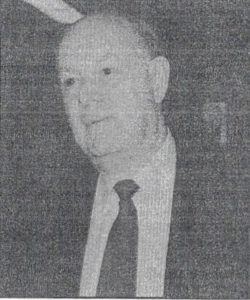By Regina Villiers. Originally published February 8, 1995 in The Suburban Life, added February 13, 2017.

Ed Dooley, who spent his career at WLW, talked to the Madeira Historical Society about the history of radio.
The waves of nostalgia awash in the audience would have floated the Titanic on a recent evening when Ed Dooley, a 26-year resident of Madeira, talked about “Old Time Radio” at a Madeira Historical Society meeting.
Dooley, who gave a carefully choreographed program on early radio in Cincinnati, is a retired chief engineer of WLW television. He joined the Crosley Broadcasting Corporation as a staff engineer in 1956 after he graduated from college. He moved up to chief engineer at WLWT in 1963, a job he held until he retired in 1987.
While at WLW, he knew and worked with such greats as Peter Grant and Ruth Lyons.
But his interest in radio goes back to his childhood. He remembers listening to all the old-timers on WLW when he was a child growing up in Winchester, Ky.
“Radio was our recreation,” he said. “It was a big part of our lives.
He has a collection of recordings of over 5,000 radio programs, and he used some of them, along with slides, that mesmerize his audience, transporting them back through the years.
I probably was transported back as much as anyone there, for no subject arouses nostalgia in me more than radio.
As children, my brother and I rushed home from school every day to listen to “I Love a Mystery,” and every Sunday afternoon we listened to baseball games. Radio was our only contact to the Major Leagues outside of the newspaper.
Radio began in Cincinnati back in March 1922 when Powell Crosley, an inventive and innovative man, first put WLW on the air. Those early efforts of Crosley gave birth to the “Cradle of the Stars” and gave Cincinnati a legacy that was never equaled in the field of radio.
The lineup of people who started out at WLW sounds like a list from “Who’s Who” of the entertainment world.
Dooley played a recording of a youthful Red Skelton in 1937 on a WLW program, “Avalon Time,” along with Red Foley, Del King and Jeanette Davis, who went on to fame on Arthur Godfrey’s TV show.
He also played a 1938 recording of a 16-year-old singer, Doris Day, singing “Little Sir Echo.” She sang from one of the dance band remotes, and Dooley added that she was on crutches that night, having survived a serious car accident that ended her dancing career and turned her toward singing.
Other big names who started at WLW and went on to become network stars and entertainment legends include Fats Waller, the Ink Spots, Jane Froman, Red Barber, Durward Kirby and Andy Williams, who sang as a child at WLW, along with his brothers.
The actor and star of “Green Acres,” Eddie Albert, started out at WLW, not as an actor, but as a singer. He was part of a trio, “The Threesome-Grace, Herb and Eddie.” And of course, Dooley also played a bit of a recording of Albert’s early singing.
Probably the best-known singer today to start at WLW is Rosemary Clooney, who sang there with her sister, Betty. In his book, “Early Cincinnati Radio,” Joe Rice described them as “two shy girls from Maysville who got the audition and their first broadcasting experience in 1945.”
Dooley also dropped WLW names that night that many had forgotten, but the mention of them brought smiles and nods of remembrance from the audience.
There are WLW names like Pa and Ma McCormack, Milly and Dolly Good, Arthur Chandler, the Doodlesockers, Bill Nimmo, Rod Serling, Dick Noel, Homer and Jethro, Bill McClusky. And the list goes on.
The first soap opera, “The Life of Mary Southern,” began at WLW. And in 1934, 23-year-old Virginia Payne began starring as “Ma Perkins,” the mother of all soap operas. It stayed on the air until the 1960’s.
Some of the early WLW programs were “Top of the Morning,” “Avalon Time,” “An Evening at Crosley Square,” “Plantation Party,” “Boone County Jamboree,” and of course, “Moon river,” probably the best-loved of all. “Moon River” can still be heard (on recordings) on Sunday evenings on WVXU, in case you want to tune in.
The first children’s show on radio, “Seckatary Hawkins,” started on WLW. It was spawned from a series of children’s books popular at that time, written by Robert F. Schulkers who was a writer at the Cincinnati Enquirer.
Ed Gallenstein owns a signed, mint copy of one of the Seckatary Hawkins books, which he won as a child in Maysville, Ky., when he entered a contest. Books were given for the best letters written to the show. Seckatary Hawkins encouraged kids to remember that “a quitter never wins, and winner never quits.”
In the 1950’s, when Gallenstein himself went to work at the Enquirer, he came face-to-face with his childhood idol, Schulkers, alias Seckatary Hawkins. Schulkers by then was an old man nearing retirement and working in the Enquirer library.
After Dooley’s presentation to the historical society that night, people walked out to their cars, smiling and reminiscing about Dick Tracy, Jack Armstrong, and the programs they listened to as children.
I came home and checked out my collection of radios, especially my 1928 Zenith console that still works. Though the sounds coming out of it today don’t match its appearance, I can close my eyes and touch it and hear the big band sounds which at one time must have flowed from it until far into the night. Its four push buttons still hold the yellowed call letters – WLW, WKRC, WCKY and WSAI.
If reading this evokes any of your own stories and memories of radio I’d certainly like to hear them. Maybe we can continue this story.